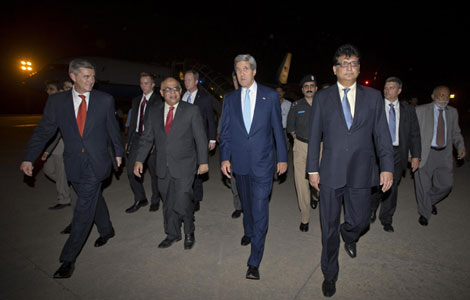Rising property prices ring alarm bells
Updated: 2013-08-01 10:06
(Xinhua)
|
||||||||
The city's situation is a microcosm of the economy as a whole. Several leading economic indicators dipped in the first half. The preliminary purchasing managers' index for China dropped to 47.7 in July, down from a final 48.2 in June and the lowest in 11 months, an HSBC report showed. Meanwhile, exports took a surprising tumble in June, dropping 3.1 percent year on year, customs data indicated.
In fact, more than 70 percent of China's social financing went into the property sector and local government financing vehicles in the first five months, and that pushed up financing costs, according to Tang Jianwei, a senior analyst on macroeconomics at the Bank of Communications.
Total social financing surged 50.2 percent to 9.11 trillion yuan during the first five months, prompting concerns about excessive money supply and financial risks.
"The real interest rates are over 9 percent, far above the GDP growth, and that's why the fairly loose liquidity failed to boost economic growth," said Tang.
Tang was echoed by Yin Zhongli. "Pent-up demand is not to blame for rising prices; the true cause is the loose liquidity," said the CASS economist.
Soaring prices have meant profits for property developers. Out of 35 such firms to have issued performance reports for the first half, 21 registered climbing year-on-year profits, according to data from the country's two bourses.
China Vanke and Poly Real Estate Group Co., Ltd., the country's two largest property developers by market value, both registered profit growth of over 30 percent in the January-June period.
Meanwhile, Chinese cities have seen prices on land bids surge amid the waning effects of curbing measures. "Competition for land has become hot since May," a report from the China Land Surveying and Planning Institute said.
Analysts say local governments are also encouraging land sales, as a slowdown in fiscal revenues and lingering concerns of credit tightening may squeeze the funding pipelines for local government financing vehicles.
"The property market runs on expectations, so we must pay attention to new record highs in land sales," warned Zhu Zhongyi, vice president of the China Real Estate Industry Association.
At Tuesday's meeting, central authorities pledged to increase support for the real economy and push human-centered urbanization, while promoting the stable and healthy development of the real estate sector.
"Above all, local governments should find a way to guide private capital to more monopolized industries," urged Li Tiegang, a professor at Shandong University.
Most Viewed
Editor's Picks

|

|

|

|

|

|
Today's Top News
7.5% GDP growth 'in reach' this year
Surveillance plan files declassified
Xi vows to protect maritime interests
Snowden's father thankful to Putin
UN to probe alleged Syria chemical attacks
Saudi blogger faces lashes for 'insulting Islam'
Memorial a tribute to WWII 'comfort women'
Hollywood unpaid for movies
US Weekly

|

|















